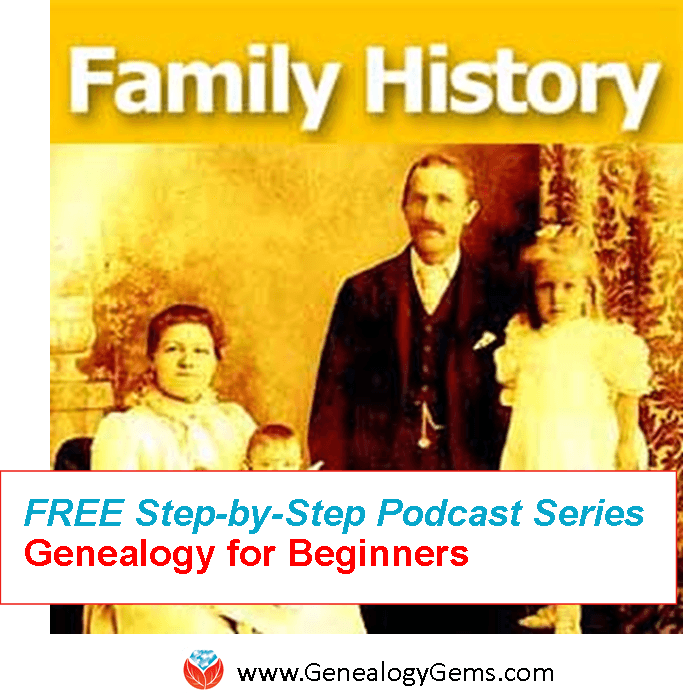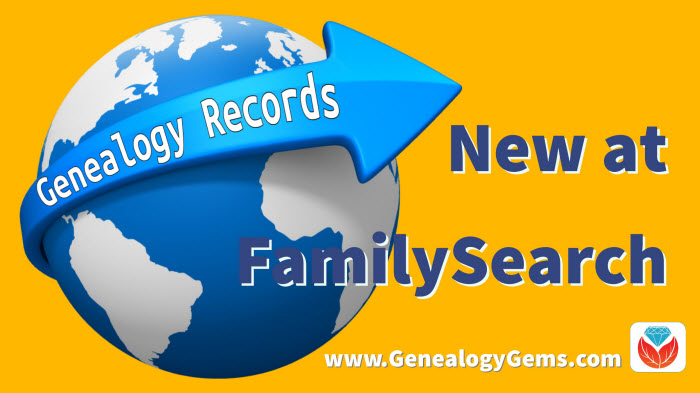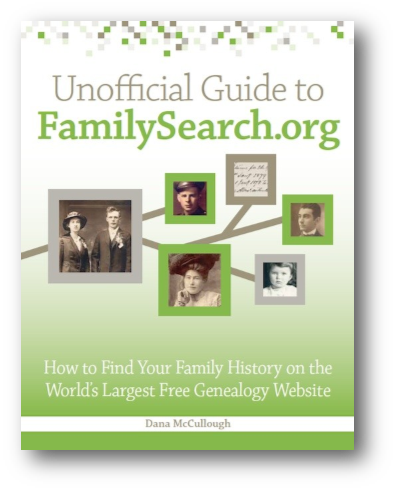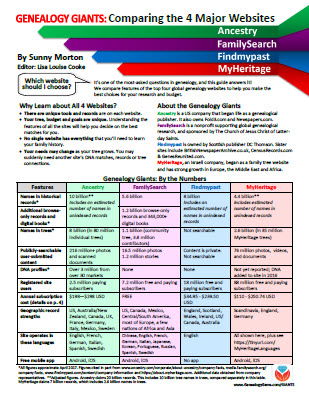by Lisa Cooke | Jun 11, 2014 | 01 What's New, Beginner, Family History Podcast, Libraries, Research Skills
Family History: Genealogy Made Easy Podcast
with Lisa Louise Cooke
Republished June 11, 2014

Listen to the Family History: Genealogy Made Easy podcast by Lisa Louise Cooke. It’s a great series for learning the research ropes and well as refreshing your skills.
https://lisalouisecooke.com/familyhistorypodcast/audio/fh35.mp3
Download the Show Notes for this Episode
Welcome to this step-by-step series for beginning genealogists—and more experienced ones who want to brush up or learn something new. I first ran this series in 2008-09. So many people have asked about it, I’m bringing it back in weekly segments.
Episode 35: Do Your Genealogy at the Public Library, Part 2
In Episode 34, Patricia Van Skaik, Manager of the History and Genealogy Department of the Public Library of Cincinnati and Hamilton County, talked with me about the unique genealogical resources in public libraries just waiting to be discovered. She gave us some great ideas on how to prepare for your visit to get the most out of your time at the library.
Today, we go deeper into genealogy research at the public library. Pat is back and she talks to us about:
- How to search an online library card catalog, including advanced search methods;
- What kinds of unique collections may be at public libraries, and helps us learn to ask for exactly what we want!
- The obstacles librarians face when it comes to cataloguing large and unique collections that may interest genealogists.
So dust off your library card and grab your book bag and let’s head back to the public library!
Top Library Tips from Pat and Lisa
- You don’t have to be advanced on computers to use advanced searches. Use these to home in clearly on what you’re looking for!
- Don’t think of the public library as just as place to go look at their holdings. Talk to librarians about how to use resources (databases, websites) and how to evaluate what you’ve discovered.
- Some items are buried at the library. Asking for help may lead to accessing just the records you want. Examples include items in pull-out collections, closed stacks (not in the public areas of the library) and maps, which aren’t always listed in the card catalogue.
- Tell the staff what materials are important to you. Your interest may lead these items to become more accessible, or be indexed or digitized.
Separate your search terms in advanced searches. Don’t just keyword search “marriages San Francisco.” Enter these terms separately in the advanced search. You may bring up items not found while searching these keywords together.
A lot of local history and genealogy materials do not circulate through interlibrary loan. Some items are totally unique and people travel to that library to see it, so they don’t send it out. One option is to ask the librarian to check the index and table of contents, then scan or photocopy the pages of interest to you and send them. There may be a charge for this but it’s better than not being able to get the book at all!
Finally, don’t make assumptions. Particularly, Pat says, don’t assume that…
- A small library doesn’t have much advanced technology;
- A library resources only cover its immediate locale; and
- If you can’t see it is not there! Ask about closed stacks.
Links for Public Libraries and Library Resources
WorldCat.org (to search for materials across multiple libraries)
Library Finder websites:
Australia
Canada
by Lisa Cooke | May 1, 2015 | 01 What's New, Ancestry, British, Church, Findmypast, images, MyHeritage, Records & databases
 Every Friday, we highlight new genealogy records online. Scan these posts for content that may include your ancestors. Use these records to inspire your search for similar records elsewhere. Always check our Google tips at the end of each list: they are custom-crafted each week to give YOU one more tool in your genealogy toolbox.
Every Friday, we highlight new genealogy records online. Scan these posts for content that may include your ancestors. Use these records to inspire your search for similar records elsewhere. Always check our Google tips at the end of each list: they are custom-crafted each week to give YOU one more tool in your genealogy toolbox.
This week: British POWs in World War I, North Carolina marriages, and church records for the Evangelical Lutheran Church in America and various denominations in Scotland.
BRITISH POWs IN WWI. Prisoners Of War 1914-1920, with over 43,000 records with images at FindMyPast, consists of “10 series of British Foreign Office documents relating to prisoners held by the Ottomans during World War One. They not only include the names of military personnel taken prisoner–both allied and foreign–but also the names of civilians, merchant seamen, fishermen, diplomatic employees and more.” Some documents “contain the names, ranks and locations of PoWs and provide insights into life in the Ottoman camps. They contain details of requests made by inmates for items including footballs and biscuits, details of visits by foreign diplomats and reports on camp conditions.”
NORTH CAROLINA MARRIAGE RECORDS. Ancestry has a new collection of North Carolina “marriage bonds, licenses, certificates, and registers, as well as indexes and abstracts to the various records from 87 North Carolina counties….Of special interest to African American researchers are records of cohabitation, which were required to be recorded in 1866 in order for the marriages of recently emancipated slaves to be legally recognized.” The records span 1741-2011.
SCOTLAND CHURCH RECORDS. Births, baptisms, banns and marriages, deaths and burials are among a slew of newer records searchable on MyHeritage.com. According to the site, “The records in this collection were taken from Kirk Session material of the Church of Scotland, other Presbyterian churches, and also the registers of the Religious Society of Friends (Quakers). These parish registers cover a wide range of dates (from 17th to 19th century) and many of them are not to be found in any other record source.” Information listed in these records may include names, family relationships, dates and places of events and details of the parish.
U.S. LUTHERAN CHURCH RECORDS. Baptism, confirmation, marriage and burial records from more than 2000 congregations of the Evangelical Lutheran Church of America (1875-1940) are now on Ancestry. These have been available on Archives.com but have migrated to its parent site. “The information…varies from congregation to congregation (and sometimes from minister to minister). In some ethnic congregations, you may run into records in German, Danish, or some other language….Within the collection you may also find membership records, with some listing the names and dates of admission, communion records, and how they were received into the church.”

Google tip of the week: If you see a record collection online but don’t have a subscription to the website that hosts it, Google the name of the database. See whether a free site (like FamilySearch) or another site to which you do have access also hosts the same data set or a similar one. Can’t find it? Click on the description of the record collection (you can generally read the description even if you can’t search the records themselves) and read its source. It may come from a book or a resource that’s been microfilmed–something you can search for on WorldCat and borrow to a library near you. This tip is brought to you by The Genealogist’s Google Toolbox, 2nd edition–fully revised and updated in 2015!
by Lisa Cooke | Oct 20, 2017 | 01 What's New, Records & databases
Millions of records from around the world are new at FamilySearch this week, and are completely free! These new collections include Australia, Denmark, Finland, France, Italy, and South Africa. PERSI also got a big update this week at Findmypast, as well as new and updated records for Canada, England, and Ireland.

New collections free at FamilySearch
Australia. The new South Australia, Immigrants Ship Papers, 1849-1940 collection includes immigrants’ ships papers, containing a record of births and deaths aboard, 1849-1867 and 1873-1885. Indexed records in this collection include passenger lists arriving and departing from South Australia. (Original records in the State Records of South Australia, Adelaide.) Get started with Australian genealogy research with these tips from an expert at Legacy Tree Genealogists!
Denmark. FamilySearch has been adding census records for Denmark recently, and the latest new collection is the 1921 Denmark Census. This collection includes over 430,000 images, and these census collections were all provided by MyHeritage and previously from the National Archives of Denmark.
Finland. Church Census and Pre-Confirmation Books, 1657-1915: This collection contains church census books and pre-confirmation books kept by the Lutheran Church in Finland. These records come from a database at MyHeritage, citing Kansallisarkisto (National Archives of Finland), Helsinki.
France. Explore over half a million indexed records for Saône-et-Loire, Census, 1856, a complete indexing of the population censuses.
Italy. The Salerno, Civil Registration (State Archive), 1806-1949 collection includes civil registration (stato civile) records of births, marriages, and deaths within the custody of the State Archive of Salerno (Archivio di Stato di Salerno). Almost 6 million images are in this collection, and availability of records is largely dependent on time period and locality.
South Africa. Lastly, this collection of Pietermaritzburg Estate Files 1846-1950 is also new at FamilySearch. Records include death notices, vital records, wills, distribution accounts, and succession duty accounts.
Need help using FamilySearch? The Unofficial Guide to FamilySearch.org by Dana McCullough provides the guidance you need to discover your ancestors and make the most of the free site’s valuable resources. Learn how to maximize all of FamilySearch.org’s research tools–including hard-to-find features–to extend your family tree in America and the old country.
PERSI update at Findmypast
The Periodical Source Index (also known as PERSI) has had another large update at Findmypast. Almost 11,000 new articles and 30,000 new images have been added, covering Pennsylvania, Wyoming, Toronto, and Yorkshire. PERSI is an excellent resource for discovering articles, photos, and other material you probably won’t find using conventional online search methods.
Click here to learn more about PERSI for genealogy research. Genealogy Gems Premium Members can also check out Premium Podcast episode #135 for more tips on PERSI (sign-in required). Not a Premium Member? Click here to get started!
Canada – New & Updated Collections
From Libraries and Archives Canada: Digitization of the Canadian Expeditionary Force Personnel Service Files. “As of today, 502,740 of the 640,000 files are available online in our Personnel Records of the First World War database…Library and Archives Canada is digitizing the service files systematically, from box 1 to box 10686, which roughly corresponds to alphabetical order.”
Ancestry.com updated two of their collections for Canada this week: Ontario, The Ottawa Journal (Birth, Marriage, and Death Notices) 1885-1980 and the Canada Obituary Collection, 1898-2017. Both of these collections come from microfilmed copies of the newspapers.
England Registrations
Recently announced on Twitter: “The General Register Office for England and Wales (GRO) is piloting a service from 12 October 2017 to provide portable document format (PDF) copies of digitized historical birth and death records. The pilot will run for a minimum of 3 months to enable GRO to assess the demand for this service over a prolonged period.” England and Wales records which are available as PDFs in this extended pilot include births (1837 –1916) and deaths (1837 –1957).
Ireland: Historical Newspaper
A new historical newspaper title was added to the British Newspaper Archive this week for Northern Ireland. The Coleraine Chronicle 1844-1910 was published by Alpha Newspaper Group in Coleraine, Londonderry, Northern Ireland. The collection features nearly 3,500 issues and over 26,000 pages.
 Get the most out of your genealogy records websites subscriptions!
Get the most out of your genealogy records websites subscriptions!
Use the jammed-packed Genealogy Giants cheat sheet by Sunny Morton to quickly and easily compare all of the most important features of the four biggest international genealogy records membership websites: Ancestry.com, FamilySearch.org, Findmypast.com, and MyHeritage.com. Then consult it every time your research budget, needs or goals change. Tables, bulleted lists, and graphics make this guide as easy to use as it is informative. Available in print or digital download.
Disclosure: This post contains affiliate links and Genealogy Gems will be compensated if you make a purchase after clicking on these links (at no additional cost to you). Thank you for supporting the free Genealogy Gems podcast and blog!






